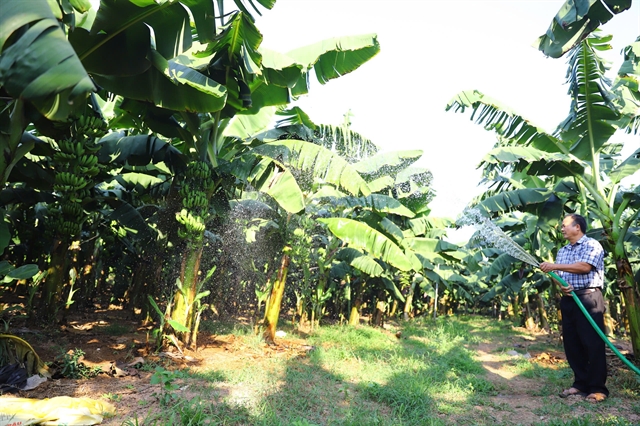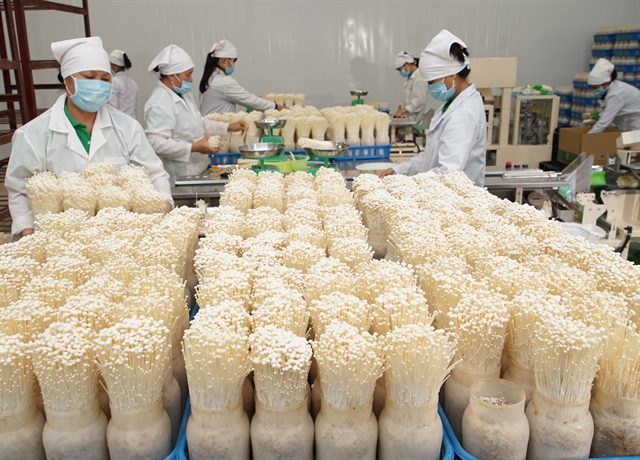 Economy
Economy

 |
| Thanh Cao KinokoImport-Export Co. Ltd. located in Đốc Tín Commune, Mỹ Đức District, Hà Nội, is a pioneer in applying advanced Japanese technology in agricultural production. Photo courtesy of the Hà Nội Agricultural Promotion Centre |
HÀ NỘI — Many cooperatives and enterprises in Hà Nội have adopted digital technology on a large scale, producing high-quality agricultural products that ensure food safety and can adapt to climate change.
Advanced technologies such as blockchain, artificial intelligence, data management, IoT, big data and drones are being applied in the production, processing and distribution of agricultural products.
Thanks to smart devices, many farmers can manage their farms conveniently and efficiently. They can water, fertilise and monitor the growth of their crops remotely, simply using a smartphone.
Director of Quảng Bị Agricultural Cooperative in Chương Mỹ District, Nguyễn Việt Hùng, shared that for the spring 2024 crop, the cooperative used drones to sow seeds over 400 hectares, reducing costs and increasing productivity. The value of their crops is now two or three times higher compared to traditional methods.
Director of the Chử Tâm Clean Vegetable Cooperative in Gia Lâm District, Trần Văn Tuấn, said that the cooperative produces various types of vegetable and fruits, such as cabbage, tomatoes, cucumbers, beans and carrots. By applying technologies like sprinkler and drip irrigation and cultivation in greenhouses and net houses, the cooperative supplies 200-300kg of clean vegetables daily, generating revenue of VNĐ50-70 million (US$1,980-2,780) per month.
Director of Hà Nội Department of Quality, Processing and Market Development, Nguyễn Thị Thu Hằng, emphasised that the digital era has empowered farmers to automate production processes, monitor supply chains and ensure transparency, safety and hygiene.
This has increased productivity and improved the competitiveness of Vietnamese agricultural products in the international market. Applying digital technology has raised economic efficiency by 10-15 per cent compared to traditional farming methods, she said.
Director of the Hà Nội Agricultural Promotion Centre, Vũ Thị Hương, emphasised that the application of digital technology is a key focus that the centre is collaborating on with local authorities to support farmers. Through training sessions, cooperatives and farmers are guided on how to build models that apply digital technology in production, implement smart monitoring systems and promote and sell products on digital platforms.
During these sessions, the centre also addresses any challenges that farmers encounter in the process, particularly helping them navigate e-commerce platforms and equipping them with skills to boost product marketing and expand their market. As a result, an increasing number of models are integrating mechanisation and digital technology into production, transforming the farming practices of Hà Nội’s farmers.
Data from Hà Nội's Department of Agriculture and Rural Development show that the city has developed 406 pioneering high-tech agricultural models, with 262 innovations in crop production, 119 livestock enterprises and 25 aquaculture projects, primarily located in districts such as Hoài Đức, Mê Linh, Gia Lâm, Thường Tín, Đông Anh and Thanh Oai.
Director of Hà Nội’s Department of Agriculture and Rural Development, Nguyễn Xuân Đại, said that the agricultural sector is drafting a high-tech agricultural development plan for Hà Nội by 2030. This strategy aims to revolutionise seed production, farming methods and the processing of agricultural products, paving the way for a modern and sustainable agricultural sector in the capital.
By 2030, Hà Nội aims to master key high-tech innovations, manage production through integrated value chains and promote high-tech agricultural models. The plan includes establishing around 30 high-tech agricultural cooperatives and nurturing at least 40 enterprises in this dynamic field.
Additionally, there is a goal to build 250 high-tech agricultural cooperative models, all aligned with sustainable development and value enhancement.
Đại highlighted that the products from Hà Nội’s high-tech agricultural enterprises must not only meet strict safety and environmental standards but also achieve international certification. This commitment will enhance product value and strengthen the competitiveness of the city’s agricultural products. — VNS